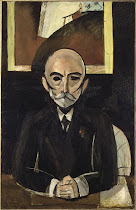When I teach, I'm constantly experimenting with new approaches. Occasionally, I surprise myself with something that really works. In a literature class, a student asked me a very straightforward question:
"what do teachers mean when they say that my essay needs 'more depth'?
Usually, 'your essay needs more depth' is a euphemism that teachers use for 'you didn't read the book'. But this student knew the material very well and it was clear that they were looking for a definition of 'depth'. My answer led to this simple and powerful thinking tool. The "three levels of analysis" approach to reading.
Level 1 - The Story What happened? The beginning, middle, end, characters, and conflict. This is usually easy to spot since the majority of stories in our culture
are obsessed with the audience 'getting it'. But there is nothing inherently easy about this level of analysis.
Simply grasping the story
of some work is a major accomplishment.
Level 1 Questions:
What happened in the story?
What were the most important parts?
When I was in high school I hated considering the 'author's intentions' since it mangled my own personal interpretation of the story. Nonetheless, an understanding of the author is an important component to critical thinking. For instance, you can add depth to your understanding of Kosinski's
The Painted Bird by discovering why he chose a child as a protagonist. For additional depth, understand the historical context (post-Holocaust) as well as the rationale for banning the book in Poland for 23 years.
Level 2 Questions:
Considering their life, why did the author write this work?
What did the author want us to think and feel?
These are our interpretations of the text with a particular emphasis on how it fits into the big picture. This often leads to discussing significance that the author did not directly intend (for instance if Charles Dickens should be considered a feminist). Level 3 requires an articulate
worldview and most people are intimidated to begin their own school of thought. The easiest method for level 3 analysis is to study a popular critical worldview, such as a feminist,
Marxist, or psychoanalytical perspective, and look for answers to their questions. One of my students wrote an interesting paper that approached
KRS-One's Sound of Da Police as a postcolonial scholar.
Level 3 Questions:
What were the author's blindspots?
What does this story tell us about our culture?
This approach made me realize that we teach these levels throughout a student's life without explicitly stating it. Children are expected to simply regurgitate the details of the plot. High school students are trained to consider the author's intentions. And University students learn to read texts through different critical approaches (
Marxist, postcolonial, feminist etc.)
A hard-working high school student can get hung up on the first level of analysis. A sure indicator of this is that they treat the characters as if they were real people. This leads to theses about what characters should have done:
In Great Expectations, Pip would be happier if he forgot about Estella.
While this essay might have exceptional clarity and proof it lacks depth because it analyzes the plot and argues for different events. (as opposed to accepting the story as a fixed world with each event deliberately constructed by the author). What they should be arguing is:
Charles Dickens is trying to show his readers that Pip would be happier if he forgot about Estella.
This might seem like a slight variation but it is, in fact, a major shift in analysis -from the first level of story to the second level of the author's intentions. This allows the student to demonstrate an understanding of the author's life (historical context) and style (their contribution to the literary tradition). Finally, a similar thesis, which includes the third level of analysis, can look like this:
Dickens' choice to show his readers that Pip does not need Estella establishes him as an early feminist author.
That thesis is 'deep' considering that the student needs to demonstrate an understanding of all three levels: the plot, Dickens' intentions, and feminism.
Happy essay writing.







1 comment:
if only i had known that...
Wow, that is an amazing clear, concise, helpful introduction to...reading...
Although it makes it seem as if the third level is as easy as a change of articles and pronouns, it nails it...Its so funny i have become so excited over it.
I actually do miss my english lit classes, that came to be my anthropology and women studies classes that have ended up in a little bit of calvin and hobbes before i go to bed. Oh I miss academia hahaahahahahah and you!
Hey can I send this to teachers (especially Mr. Arrogance No Tolerance but I am actually very smart Mr. Protic)?
Post a Comment